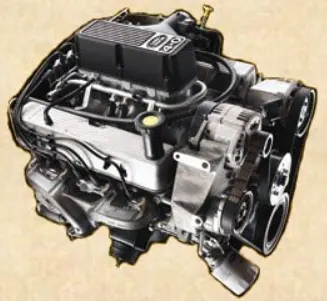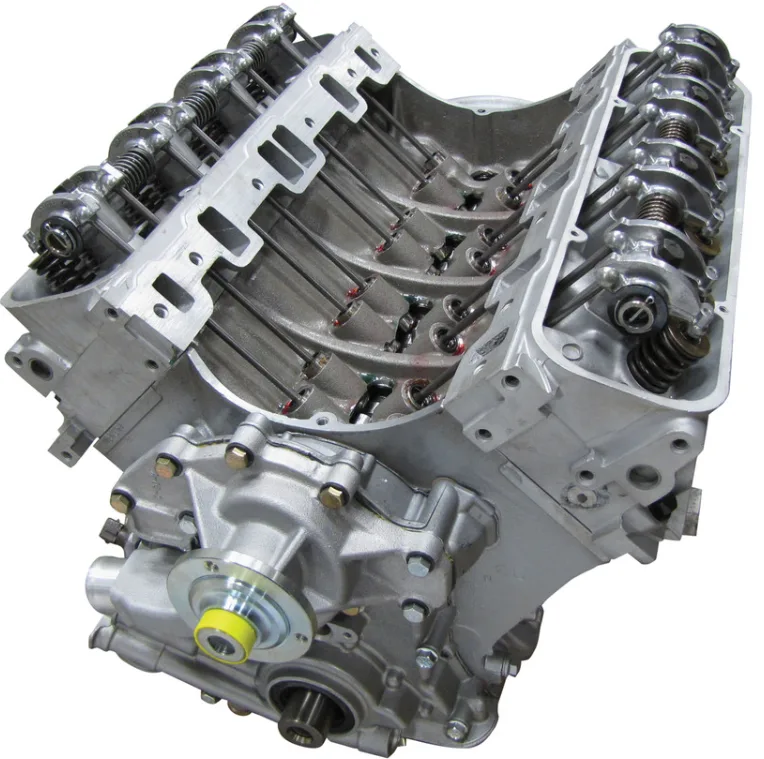As an off-road and automotive enthusiast, I’ve always had a soft spot for Land Rover vehicles. They’re known for their luxury, off-road capabilities, and a certain timeless charm. While Land Rovers are often seen as symbols of adventure and exploration, they’re only as good as the engines that power them.
The top five reliable Land Rover engines include:
- V6-3.0 liter engine
- V8-5.0 liter engine
- V8-4.0 liter engine
- V8-4.6 liter engine
- V8-3.6 liter engine
In this article, I’ll delve into the world of Land Rover engines and share my insights on five reliable powerhouses you can trust.
1. V6-3.0 Liter Engine:
One Land Rover engine that has captured my attention is the V6-3.0 liter powerhouse. This engine is not only reliable but also packs a punch in terms of performance.

Let’s take a closer look at its impressive specs and its use in various Land Rover models.
It includes:
- Variants including diesel, gasoline, and hybrid
- Upgraded ratings for power and torque
- The gasoline variant can produce a maximum power of up to 380 horsepower, giving off a total torque of about 340 lb-feet.
- The diesel variant can produce a maximum power of up to 340 horsepower, giving off a total torque of about 520 lb-feet.
- This engine is designed excellently for SUV automobiles, including their hybrid version. The structural design of this engine includes aluminum alloy, which can withstand the stress of the environment.
Specification | V6-3.0 Liter Engine |
Displacement | 2995 cc |
Maximum Power | 335 bhp at 6500 RPM |
Maximum Torque | 450 Nm at 3500-5000 RPM |
Variants | Diesel, Gasoline, Hybrid |
Gasoline Variant Power | Up to 380 horsepower |
Gasoline Variant Torque | About 340 lb-ft |
Diesel Variant Power | Up to 340 horsepower |
Diesel Variant Torque | About 520 lb-ft |
Structural Material | Aluminum Alloy |
Model Integration | Range Rover, Discovery, Velar, Sport |
Range Rover Sport 3.0L V6 SE Petrol:
This engine boasts a 2995 cc displacement, generating 335 bhp at 6500 RPM and 450 Nm at 3500-5000 RPM. It’s a versatile engine that can power multiple Land Rover models, and I’ve had the privilege of experiencing it in action.
Model Integration:
This 3L Land Rover engine was introduced in the market in 2012 and was readily available for the models of Range Rover, including the Discovery, velar, and Sport.
This engine was installed in the Land Rover Discovery model in 2017 and the sports model between 2013 and 2019. Besides this, this engine was installed in the Velar model of Land Rover in 2017.
Excellence in Design:
The structural design of this engine is something that stands out. Made with aluminum alloy, it's built to withstand the rigors of various environments, whether you're tackling rugged terrains or cruising along the highway. The lightweight yet durable design is a testament to Land Rover's commitment to quality.
Along with these features, users have also reported some of the drawbacks and disadvantages of this engine, but it can be compensated with proper maintenance.
Some of these disadvantages include:
Issue | Description |
Failure of components | With excessive use of this engine, it is common that components like blower drive, head gasket, and crankshaft can fail. These components can be replaced with the new ones. |
Cleaning of components | Some components in this engine are more prone to dust, such as the throttle body and fuel injectors. It is advisable to clean these components to avoid the engine issues. |
Knocking sound of the engine | Sometimes, due to excess engine work and lack of proper maintenance, the engine can produce a loud knocking sound, which can create disturbance for the vehicle owners. |
2. V8-5.0 Liter Engine:
This is one of Land Rover’s most formidable engines, and I’ve had the privilege of experiencing its raw power. It’s an engine that commands attention not only for its performance but also for its impressive specifications.

This V8 model of the engine was introduced in between the years 2010-2012. They were introduced for the SUVs like Range Rover models and Discovery 4 vehicles.
Specification | V8-5.0 Liter Engine |
Displacement | 4,999 cc |
Maximum Power | 567 bhp at 6000-6500 rpm |
Maximum Torque | 700 Nm at 3500-5000 rpm |
Valvetrain | DOHC |
Transmission | 8-speed automatic |
0 to 60 mph | 4.3 seconds (SVR Petrol variant) |
Versatility and Performance:
One of the most striking things about this engine is its versatility. It’s found in various Land Rover models, each tailored to cater to different preferences and driving styles.
The Range Rover Sport 5.0L V8 SVR Petrol variant, for instance, pairs this engine with an 8-speed automatic transmission and a 4WD configuration. This combination allows it to achieve a remarkable 0 to 60 mph time of just 4.3 seconds. The sheer acceleration is a thrill to experience.
Other Trims and Variants:
The V8-5.0 liter engine isn’t limited to a single model. It finds its place in various Range Rover trims, each with its unique character. For example:
- Range Rover LWB 5.0 V8: This variant packs a maximum power of 503 bhp and a peak torque output of 625 Nm.
- Autobiography Edition (HSE Dynamic) Range Rover Sport: These trims deliver 461 lb-ft of torque and 518 horsepower.
Reliability and Performance:
Having had the opportunity to drive vehicles equipped with the V8-5.0 liter engine, I can vouch for its reliability and exceptional performance. The acceleration is exhilarating, and it handles a variety of terrains with ease. Whether you’re cruising on the highway or taking on off-road adventures, this engine doesn’t disappoint.
Drawbacks:
While the V8-5.0 liter engine is undoubtedly impressive, it’s essential to note that, like any complex machinery, it comes with some potential downsides. Some drivers have reported heating issues, especially during demanding driving conditions.
Additionally, there have been cases of timing chain issues, which are attributed to the presence of plastic-guided pins that are prone to wear and tear. These issues, however, are manageable with regular maintenance and attention to the engine’s needs.
3. V8-4.0 Liter Engine:
This gasoline engine is also considered a reliable option for Land Rover engines and was introduced in the Land Rover models between 1994 and 2001.
This engine was introduced in the models of land and range rovers such as Defender, Discovery 2, and Range Rover 2.

It was introduced in the Defender 1 model called as L316 in between the years 1994-1998. Later, the same engine was introduced in the Discovery 2 model of Land Rover vehicle between 1998 and 2002.
This engine has various excellent specs and features, including:
- This engine holds a power rating of about 195 hp with a torque value of 253 lb-ft. The models of the same engine before 1999 showed issues of variation, but it was fixed later in this model.
- This engine has a compact V8 construction of aluminum, having robust heads and block regions for the cylinder.
- It is a reliable DOHC engine with a capacity of more than 4 liters and gives off a better engine management system to the owners, which increases its reliability. A person can cover more than 120,000 miles with this engine if it is appropriately maintained.
Specification | V8-4.0 Liter Engine |
Displacement | 4.0 liters |
Maximum Power | 185 hp (182 bhp) at 4,750 rpm |
Maximum Torque | 314 Nm (232 lb-ft) at 3,100 rpm |
Construction Material | Aluminum |
Common Applications | Defender, Discovery 2, Range Rover 2 |
Compact and Robust:
- One of the standout features of this engine is its compact V8 construction, crafted from aluminum. This not only reduces weight but also contributes to its durability.
- The engine’s block and cylinder heads are designed to withstand the rigors of both on-road and off-road adventures.
Reliability and Longevity:
In my experience, the V8-4.0 liter engine has showcased remarkable reliability. Properly maintained, it can cover more than 120,000 miles without major issues, a testament to its robust design. It’s a workhorse that can take you through various terrains and adventures without breaking a sweat.
Drawbacks and Maintenance:
Like any engine, the V8-4.0 liter engine has its share of common issues. Some owners have reported problems related to liners, injection systems, cracks in the engine, and issues with the electrical sensors.
While these issues can be concerning, they are manageable with the help of a skilled automobile expert. Regular maintenance and periodic checks can go a long way in preventing major problems and ensuring the engine’s longevity.
4. V8-4.6 Liter Engine:
This 4.6 L gasoline V8 engine is also considered a reliable option for Range Rover models and holds two variants before its launch. These include the Gems and Bosch variants used in the market until 1999. This 4.6 L-V8 range rover was introduced in the market between 1994 and 2004.

Variants and Rover V8 Lineage:
This engine can be found in several Land Rover models, notably the Discovery and Range Rover. It’s important to note that this engine is part of the Rover V8 lineage, which has been used in Land Rovers throughout the 1990s.
The Rover V8 engine has a bore of 94 mm (3.70 in) and a stroke of 71.12 mm (2.8 in). This particular configuration has been a hallmark of Land Rover’s engine lineup for years.
- V8 gasoline engine holds options of two variants and offers an overall power rating of about 232 horsepower.
- It gives off an overall torque rating of about 305 lb-ft, more than the 4 L-V8 engine.
- The structure of this engine is the same as the V8 engine with 4L capacity, but it is bigger in size and consumes excess oil.
Specification | V8-4.6 Liter Engine |
Displacement | 4,552 cc (4.6 liters) |
Maximum Power | 232 hp at 4,750 rpm |
Maximum Torque | 305 lb-ft at 3,100 rpm |
Bore and Stroke | 94 mm (3.70 in) bore, 71.12 mm (2.8 in) stroke |
Common Applications | Discovery, Range Rover |
Reliable Powerhouse:
My experience with the V8-4.6 liter engine has been a testament to its reliability and robust performance. It’s an engine that’s well-suited for Land Rover vehicles, especially those that need to handle a variety of terrains and driving conditions.
The power it delivers is more than sufficient for most driving needs, and it provides a dependable and enjoyable ride.
Common Issues and Maintenance:
Besides these excellent features and specs, V8-4.6 liter Land Rover engines have been reported about some issues such as the appearance of cracks, slipping of the liners in cylinders, jamming in the crankshaft, and poor injection system.
These problems can arise due to poor maintenance and can be fixed easily. It is better to keep an eye on the components so that consequences can be dealt with in a better way.
5. V8-3.6 Liter Engine:
This 3.6L V8 engine in the Range Rover category is also considered a fine diesel engine with a turbocharger. This engine was introduced in the models of the year 2007-2013.
This V8 turbocharged diesel engine was installed in the Rover 3, called L-322, between 2006-2010, and in Range Rover Sport 1, called L-320, between 2007-2010.
The V8-3.6 liter engine is a diesel-fueled marvel that brings exceptional power and torque to Land Rover vehicles. It’s equipped with two variable-geometry turbochargers, one for each bank of cylinders, ensuring efficient performance.
Specifications:
These specs include:
- V8 turbocharged diesel engine has a technology of variable valve timing.
- It has the capacity to produce power up to 275 horsepower and has a rating of 475 pound-feet.
- This engine is excellent for heavy vehicles and can reach up to 60 mph within 8 seconds.
- The fuel economy of this engine is within the range of 23-26 mpg, and its cylindrical heads are made of aluminum and graphite iron.
- This engine has a total of 32 valves, and each cylinder has 4 valves in it.
Specification | V8-3.6 Liter Engine |
Engine Type | Diesel |
Number of Turbochargers | Two (Variable-Geometry) |
Block Material | Compacted Graphite Iron |
Maximum Power | 275 hp |
Maximum Torque | 475 lb-ft |
Valvetrain | 32 valves (4 valves per cylinder) |
0 to 60 mph | Approximately 8 seconds |
Fuel Economy | 23-26 mpg |
Impressive Power:
This engine has the capacity to produce up to 275 horsepower, along with a substantial rating of 475 pound-feet of torque. These numbers translate to robust performance and make it particularly suitable for heavy vehicles.
Whether you’re cruising on the highway or navigating challenging terrain, the V8-3.6 liter engine delivers the power you need.
Quick Acceleration:
One thing I’ve noticed during my experiences with this engine is its ability to provide quick acceleration. Going from 0 to 60 mph in approximately 8 seconds ensures you have the necessary burst of speed when you need it. It’s a crucial feature for both on-road and off-road driving.
Fuel Efficiency:
Despite its power, this engine offers a commendable level of fuel efficiency.
With a fuel economy ranging from 23 to 26 miles per gallon, it strikes a balance between performance and practicality, making it a cost-effective choice in the long run.
Engine Components:
The V8-3.6 liter engine features a total of 32 valves, with four valves in each cylinder. This design contributes to efficient combustion and improved engine performance.
The use of aluminum and graphite iron in the construction of the cylinder heads ensures durability and longevity.
Common Issues and Maintenance:
While this engine is known for its reliability, like any mechanical system, it’s not without its potential issues. Some owners have reported problems such as cracking of air pipes, breaking of manifold gaskets, issues with the turbine run, and even bursting of the thermostat housing. These issues often arise due to wear and tear or inadequate maintenance.
However, there is one critical issue to highlight: bending connecting rods. If not addressed promptly, this problem can lead to misfiring and engine seizure. To avoid costly repairs, it's crucial to stay vigilant and address any issues promptly.
Key Considerations for Assessing Engine Reliability:
When evaluating the reliability of Land Rover engines, several factors come into play. To help you make an informed decision, consider the following ranking factors:
- Age and Mileage:
The age and mileage of the engine are pivotal factors, as they significantly impact its performance and overall reliability. Newer engines with lower mileage tend to be more reliable and durable.
- Customer Reviews:
Reading reviews from other Land Rover owners is a valuable source of information. These firsthand experiences can offer insight into the real-world reliability of various engine models and help you make an informed decision.
- Known Issues:
Some Land Rover engines have known issues that can affect their reliability. It’s essential to be aware of these issues and factor them into your engine selection process.
- Manufacturer Specifications:
Consider the specifications set forth by the engine manufacturer. These specifications can provide insights into the engine’s design and intended performance, helping you choose a reliable option.
- Performance:
The engine’s performance can serve as a crucial factor in its reliability. A well-performing engine is less likely to have hidden problems, making it a more dependable choice.
- Maintenance History:
The engine’s maintenance and service history plays a crucial role in determining its long-term reliability. Well-maintained engines are more likely to perform consistently over time.
By assessing these ranking factors, you can make a more informed choice when selecting a Land Rover engine that suits your reliability and performance requirements.
Longevity of Range Rover Engines:
The longevity of Range Rover engines, as with any vehicle’s engine, greatly depends on proper maintenance and regular inspections. With diligent care for the vital components of the engine, your Range Rover can potentially reach impressive mileage figures, typically in the range of 200,000 to 300,000 miles.
To maximize the lifespan of your engine, it's advisable to prioritize maintenance over replacing or repairing engine components later on. Engine replacements and major repairs can incur substantial costs, often reaching into the thousands of dollars.
Therefore, having a warranty in place can provide a valuable safety net, helping to avoid the burden of heavy bills and ensuring that your Range Rover remains a reliable and long-lasting companion on your journeys.
Maintenance Issues in the Range Rover Engines:
Maintenance issues in Range Rover engines have been a point of concern for some owners. While Range Rovers are known for their luxury and performance, it’s true that some models have faced reliability challenges.
One of the recurring issues reported by Range Rover owners is related to the timing chain. Problems with the timing chain can lead to significant engine complications, and addressing this issue often requires professional assistance. Additionally, issues with the cooling system and oil leakage have been observed, potentially contributing to engine troubles.
Maintenance and repair costs in luxury vehicles, like Range Rovers, can be substantial, and labor costs can significantly add to the expenses. To mitigate these potential financial burdens, opting for a vehicle with a warranty is a prudent choice.
A warranty can offer peace of mind by covering certain repair and maintenance costs, ensuring that you can enjoy the luxury and performance of your Range Rover without being unduly concerned about unforeseen repair expenses.
Final Thought:
Land Rover offers a range of reliable engines that cater to diverse preferences and requirements. From the versatile V6-3.0 liter to the robust V8-4.6 liter, each engine has its unique strengths and capabilities. However, it’s crucial to consider factors like maintenance, known issues, and customer reviews when making your choice.
With proper care and attention to maintenance, these engines can provide dependable performance and longevity. Whether you prioritize power, efficiency, or a balance of both, Land Rover has an engine that can meet your needs. So, when it comes to Land Rover engines, you can trust in their reliability and enjoy the open road with confidence.
Also Read:
7 Most Reliable Mercedes Engines You Can Rely On- Details
5 Reliable Land Rover Engines You Can Surely Count On
7 Most Reliable Audi Engines You Need to Consider
BMW’s 5 Most Reliable Diesel Engines You Can Truly Depend On
Frequently Asked Questions (FAQs):
Which category is considered the most reliable one in the Land Rover?
The reliable models of Land Rover include the Freelander-2, Defender 110 hard top, Discovery Sport, and Range Rover from the Evoque category.
Which model from the Range Rover engine category is considered the most reliable one?
The most reliable engine from the Range Rover category includes the:
- Diesel 3.0 L engine
- V8 engine with 5.0 L capacity
These engines are reliable, offer excellent performance, and are fuel-efficient.
Which model of Land Rover is considered the best vehicle with the least problems in it?
The Land Rover model with the least problems is the Discovery 5 model. It scored 70% in the reliability factor and is considered the vehicle with the least issues.
Are the models and engines of Land Rover considered reliable?
The engines and models manufactured by Land Rover are considered reliable ones. The engine models, especially after 2008, are deemed the most reliable. It is said to avoid engines and models manufactured between 1994 and 2000.
Which model of Land Rover is considered the most reliable one?
The Rover Sport model by Land Rover is considered the most reliable. This model of Land Rover is ranked number 6 among the 17 vehicles in the luxury SUVs category.

This is Surya. I am an experienced off-roader. I have been off-roading for many years across several terrains. I am passionate about 4×4 driving and want to share my knowledge and experience with others.
My goal is to provide you with the most comprehensive and unbiased information about off-roading.
I curated this article through my personal experience and expertise, and I hope it helps you with what you are looking for.

 (+91)9123743026
(+91)9123743026
 24/1 Nibedita Sarani. M.B. Road, Kolkata- 700051, India
24/1 Nibedita Sarani. M.B. Road, Kolkata- 700051, India